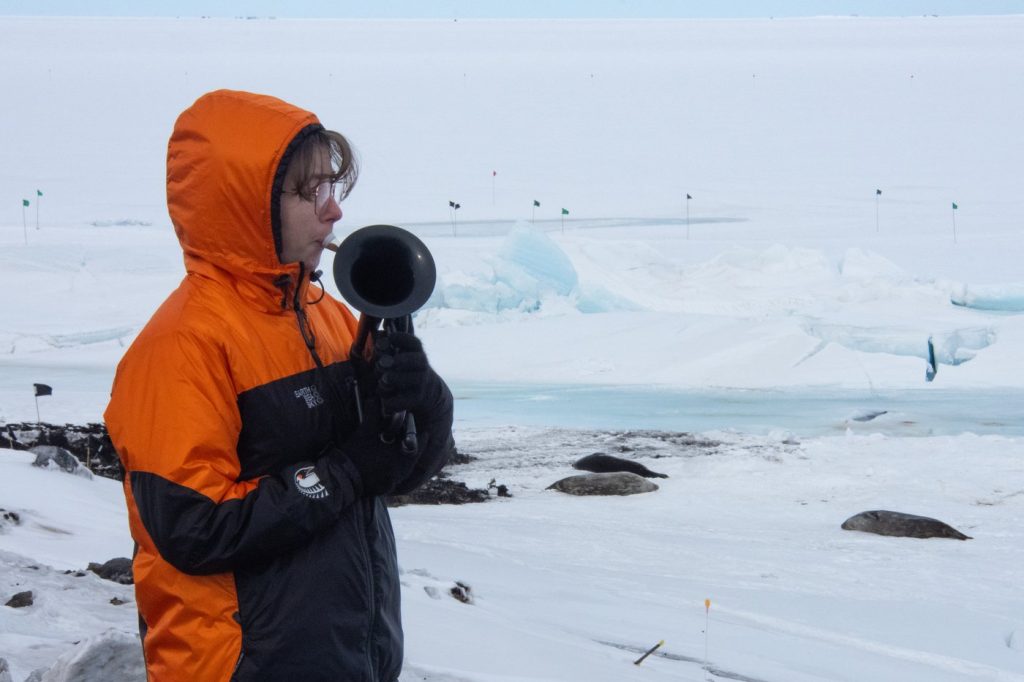WELLINGTON, New Zealand (AP) — Maintaining a career as a professional musician in the harsh climate of Antarctica requires creativity and tenacity. For Natalie Paine, a French horn player in New Zealand's navy, this is a reality she embraces daily. Since October, Paine has been one of the 21 military members stationed at Scott Base in Antarctica, where she practices in what is arguably the most isolated practice room on Earth, allowing her melodies to resonate across the frozen Ross Sea.
Paine's journey to the ice is an inspiring tale. Originally from the hot and arid climate of Adelaide, Australia, she had aspirations of becoming a scientist in Antarctica. However, after studying music at university, she shifted her focus away from the frozen continent. Years later, while serving as a musician in New Zealand's navy, she discovered military personnel were deployed to Antarctica to support scientific work. When she inquired about opportunities, her instructor confirmed that any military member, including musicians, could be eligible for those coveted postings.
Her enthusiasm rekindled, Paine faced significant challenges in securing a position in Antarctica. After four years of unsuccessful applications, she finally received a posting as a communications operator. This demanding role involves monitoring radio, phone, email, and other communication channels at New Zealand's mission at Scott Base. Paine often communicates with individuals on the icy terrain who haven’t heard other voices for extended periods, making her role both vital and isolating.
Amidst a packed schedule consisting of six-day work stretches, Paine diligently carves out time to practice scales and mouth exercises. Given the constraints of her job and the need to avoid disturbing colleagues on round-the-clock shifts, she ventures out of the main base to a historic hut, constructed in 1957 under the guidance of renowned explorer Sir Edmund Hillary when New Zealand established its presence in Antarctica. Through the window, she observes seals on the ice, inspiring new musical motifs during her practices.
The unique environment brings practical challenges as well, including selecting an appropriate instrument for the extreme conditions. Paine ultimately chose a jHorn, a beginner brass instrument designed for children that is lightweight, compact, and durable, making it less likely to freeze to her hands in freezing temperatures. Unlike a traditional brass French horn, the jHorn requires minimal maintenance, a crucial factor in the icy landscape.
Paine’s deployment to Antarctica as a musician may be unprecedented for New Zealand's navy, and her presence has been warmly welcomed at Scott Base. She has played live music during significant ceremonies, such as the changing of the flag, stepping in for the typical tunes played through speakers. Despite the challenges posed by the extreme cold, where she often wears ski gloves and hand warmers just to hold her instrument, she has successfully performed solo concerts in temperatures as low as minus 21 degrees Celsius (minus 6 degrees Fahrenheit).
Paine finds a profound connection between the collaborative efforts of nations working together in Antarctica and the essence of music. She described music as a universal language that fosters connections and reminds individuals of their ties to home, land, and each other. For her, the beauty of the untamed Antarctic landscape deepens this connection, providing both a source of inspiration and a reminder of the shared human experience in such a remote setting.











